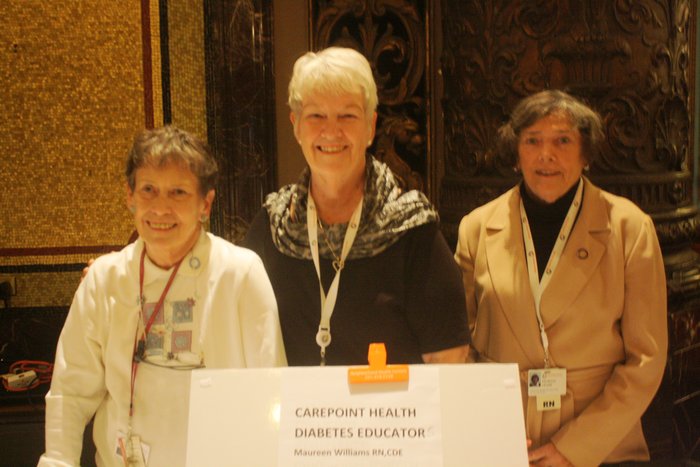Katie Hartnett, clinical nutrition manager for CarePoint, and Leah Gorhan, a nutrition student volunteer from Montclair State University, fielded a number of questions from the nearly 150 people who attended the World Diabetes Day event at the Landmark Loew’s Jersey City Theatre on Nov. 14.
The event was hosted by CarePoint Healthcare and Loew’s Theatre to provide the public information about what has become an epidemic.
CarePoint owns Hoboken University Medical Center, Bayonne Medical Center, and Christ Hospital as well as a number of smaller healthcare venues in Hudson County.
Staggering statistics still on the rise
Diabetes is a disease in which the blood has too much glucose, coming from food, muscles, and the liver. In a normal system, cells feed on the sugar by using insulin manufactured in the pancreas. When the pancreas fails to produce enough insulin, the glucose remains in the blood.
Type I diabetes—which usually affects children—results when the body’s immune system attacks the insulin, forcing a person to take insulin shots or use an insulin pump.
Type II diabetes most often hits adults when the pancreas fails to make enough insulin or the body does not it use it properly. This sometimes results from a person being overweight, and often can be controlled by diet, various medications, and exercise.
Statistics on diabetes growth are staggering.
A decade ago (based on 2001 stats), the American Diabetes Association said 20.8 million people in the United States, or 7 percent of the population, have diabetes. Of this estimated number, 6.2 million apparently did not know it. In 2011, the estimate was that 25.8 million Americans or 8.3 percent of the population had the disease; 79 million more have what is called pre-diabetes, and 1.9 million people 20 and older were disagnosised with diabetes in 2010.
Based on death certificate data, diabetes contributed to 224,092 deaths in 2002, although the yearly estimate may be as much as 40 percent higher. Studies indicate that diabetes is generally under-reported on death certificates, particularly in the cases of older persons with multiple chronic conditions such as heart disease and hypertension.
The economic impact is equally staggering with $132 billion, or one out of every 10 healthcare dollars spent in the United States in 2002. As of March, 2013, the cost is estimated at $245 billion.
There are ways to cope with diabetes
Most of those who attended the information session at Loew’s appeared to have some level of concern, either already disagosised or suffering from pre-diabetes symptoms.
One woman wanted to know if drinking coffee affected blood sugar levels. Coffee itself does not, she was told until she used sweetener. But it could have an impact on the heart, and some people suffering from diabetes also have heart issues.
A doctor would be the best person to consult, after screening of blood glucose levels and blood pressure.
“We’re trying to focus on diabetes,” Hartnett said, saying that diet is one way to help control sugar levels in the blood, and things like eating whole grains and doing away with sugary drinks help.”
“The question we get asked most is about eating out,” said Gorhan. “The portion sizes are usually double or triple of what people need.”
The solution when eating out is to share dishes, Hartnett said.
The most common form of diabetes is Type II which can be the result of being overweight; people can reduce their risk by reducing their weight.
Treatment varies depending on the severity of the diabetes, but many cases are first treated by diet before progressing onto oral medicine and finally, insulin.
But diet is a large component of treatment in all stages.
“We recommend drinking water over soda,” Hartnett said, “never regular soda.”
While there is some debate over sugar substitutes, Hartnett said there are a number of alternatives such as flavored water, and smaller portions of 100-percent juice. Generally, unsweetened coffee or tea are safe.
Caety Toerico, director for marketing and public relations out of CarePoint’s Hoboken University Medical Center, gave free orange-and-gray t-shirts to participants.
“CarePoint wants to raise awareness and educate the public about diabetes,” she said. “And we are working closely with Loew’s to make it happen.”
The historic lobby was filled with tables and a variety of medical educators, paramedical company representatives, and medical professionals, giving away information as well as providing free screenings.
Pat Leva and Maureen William, both RNs with their volunteer Rita Vinci, are part of a team that helps doctors take care of patients, educating them about how to stay well in their own homes and about the treatments available.
“I’ve had diabetes for 54 years,” Vinci said.
“Education is part of the treatment,” said William. “We tell patients what they can do every day to help maintain their own health.”
“It’s about balance,” said Leva.
Diabetes doesn’t preclude eating sweets. Rather, patients need to know how much they can have, and how to live within those limits.
Jakey Patwari, executive vice president of the CarePoint Research Institute, offered attendees the opportunity to take part in clinical research studies conducted by CarePoint, providing free trial treatments and related drugs to those who qualified.
“Some of these drugs have been tested for safety, but have not yet been approved by the FDA,” he said, noting that CarePoint has a number of ongoing studies.
Al Sullivan may be reached at asullivan@hudsonreporter.com.
